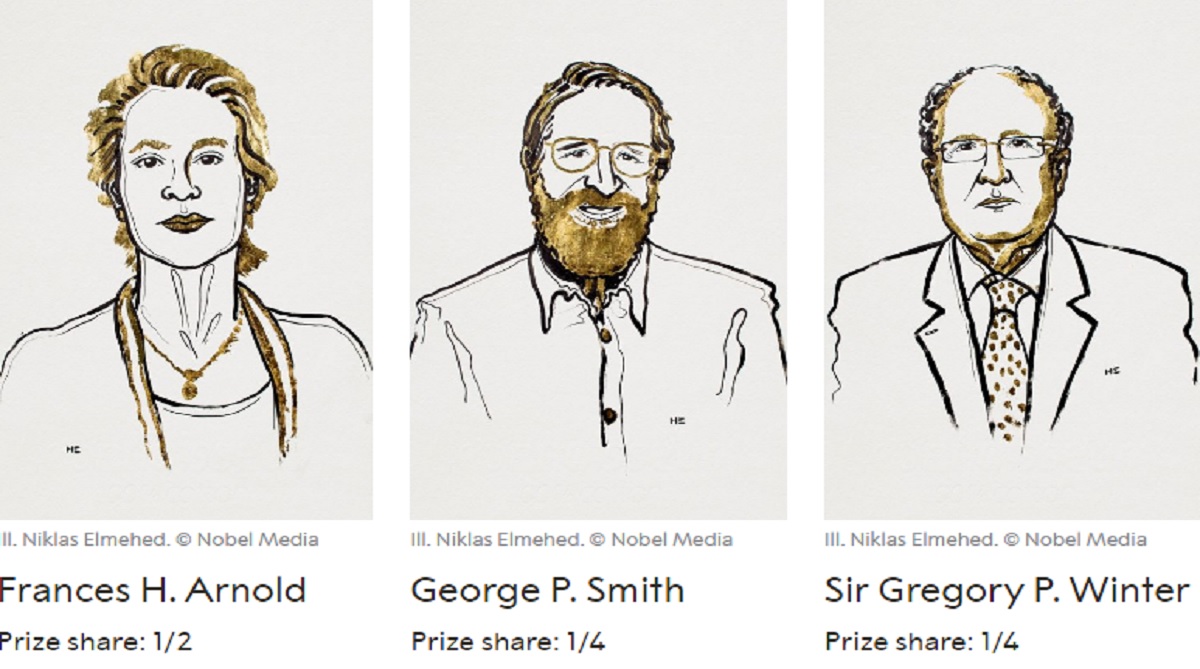Bidding farewell to Maryse Conde
Speak of Segu outside Segu, but do not speak of Segu in Segu.
The Nobel Chemistry Prize 2018 has been awarded jointly to Frances H Arnold, George P Smith, and Sir Gregory P Winter for revolutionary work in Evolutionary Science.

Frances Arnold and George Smith are from America while Sir Gregory Winter is from Britain. (Photo: nobelprize.org)
The Royal Swedish Academy of Sciences on Wednesday awarded the Nobel Prize in Chemistry 2018 to Frances H Arnold, George P Smith, and Sir Gregory P Winter for revolutionary work in Evolutionary Science with one half to Frances H Arnold and the other half jointly to George P Smith and Sir Gregory P Winter, said the Twitter handle of The Nobel Prize.
Watch the moment the 2018 Nobel Prize in Chemistry is announced.
Presented by Göran K. Hansson, Secretary General of The Royal Swedish Academy of Sciences. pic.twitter.com/j0hkL3rkpp
Advertisement
— The Nobel Prize (@NobelPrize) October 3, 2018
The winners will share a prize of 9m Swedish kronor.
The methods that the 2018 Nobel Prize laureates have developed are now being internationally developed to promote a greener chemicals industry, produce new materials, manufacture sustainable biofuels, mitigate disease, and save lives, said The Nobel Prize.
Frances Arnold conducted the first directed evolution of enzymes, which are proteins that catalyse chemical reactions. Enzymes produced through directed evolution are used to manufacture everything from biofuels to pharmaceuticals.
George Smith developed a method known as phage display, where a bacteriophage – a virus that infects bacteria – can be used to evolve new proteins, it further informed.
Sir Gregory Winter has used phage display to produce new pharmaceuticals. Today phage display has produced antibodies that can neutralise toxins, counteract autoimmune diseases, and cure metastatic cancer.
Frances Arnold and George Smith are from America while Sir Gregory Winter is from Britain.
This year’s Chemistry Laureates have taken control of evolution and used the same principles – genetic change and selection – to develop proteins that solve humankind’s chemical problems, said The Nobel Prize in a tweet.
The Award was presented by Göran K. Hansson, Secretary General of The Royal Swedish Academy of Sciences.
Interesting facts about Nobel Prize in Chemistry:
1. 109 Nobel Prizes in Chemistry have been awarded between 1901 and 2017.
2. 63 Chemistry Prizes have been given to one Laureate only.
3. 1 person, Frederick Sanger, has been awarded the Chemistry Prize twice, in 1958 and in 1980.
4. 35 years was the age of the youngest Chemistry Laureate ever, Frédéric Joliot, who was awarded the Nobel Prize in 1935.
5. 85 years was the age of the oldest Chemistry Laureate, John B Fenn, when he was awarded the Chemistry Prize in 2002.
For the year 2017, Jacques Dubochet, Joachim Frank, and Richard Henderson were awarded the Nobel Prize for Chemistry.
The winner of the Nobel Peace Prize would be announced on Friday.
ALSO READ: Nobel Prize 2018 for Medicine awarded to James P Allison and Tasuku Honjo
About the winners:
1. Frances H Arnold
Born in 1956 in Pittsburgh, USA.
Ph.D. 1985, University of California, Berkeley, USA.
Linus Pauling Professor of Chemical Engineering, Bioengineering and Biochemistry, California Institute of Technology, Pasadena, USA.
Frances H. Arnold conducted the first directed evolution of enzymes in 1993 which are proteins that catalyse chemical reactions. Since then, she has refined the methods that are now routinely used to develop new catalysts. The uses of Frances Arnold’s enzymes include more environmentally friendly manufacturing of chemical substances, such as pharmaceuticals, and the production of renewable fuels for a greener transport sector.
Frances Arnold, awarded the 2018 #NobelPrize, conducted the first directed evolution of enzymes, which are proteins that catalyse chemical reactions. Enzymes produced through directed evolution are used to manufacture everything from biofuels to pharmaceuticals.@francesarnold pic.twitter.com/TGRxgjEHzv
— The Nobel Prize (@NobelPrize) October 3, 2018
2. George P Smith
Born in 1941 in Norwalk, USA.
Ph.D. 1970, Harvard University, Cambridge, USA.
Curators’ Distinguished Professor Emeritus of Biological Sciences, University of Missouri, Columbia, USA.
In 1985, George Smith developed an elegant method known as phage display, where a bacteriophage – a virus that infects bacteria – can be used to evolve new proteins.
2018 #NobelPrize laureate George Smith developed a method known as phage display, where a bacteriophage – a virus that infects bacteria – can be used to evolve new proteins. pic.twitter.com/roX8uOFICe
— The Nobel Prize (@NobelPrize) October 3, 2018
3. Sir Gregory P Winter
Born in 1951 in Leicester, UK.
Ph.D. 1976. University of Cambridge, UK.
Research Leader Emeritus, MRC Laboratory of Molecular Biology, Cambridge, UK.
Sir Gregory Winter used phage display for the directed evolution of antibodies, with the aim of producing new pharmaceuticals. The first one based on this method, adalimumab, was approved in 2002 and is used for rheumatoid arthritis, psoriasis and inflammatory bowel diseases. Since then, phage display has produced antibodies that can neutralise toxins, counteract autoimmune diseases, and cure metastatic cancer.
Sir Gregory Winter, awarded the #NobelPrize in Chemistry, has used phage display to produce new pharmaceuticals. Today phage display has produced antibodies that can neutralise toxins, counteract autoimmune diseases and cure metastatic cancer. pic.twitter.com/p5fOfo0DwJ
— The Nobel Prize (@NobelPrize) October 3, 2018
Advertisement